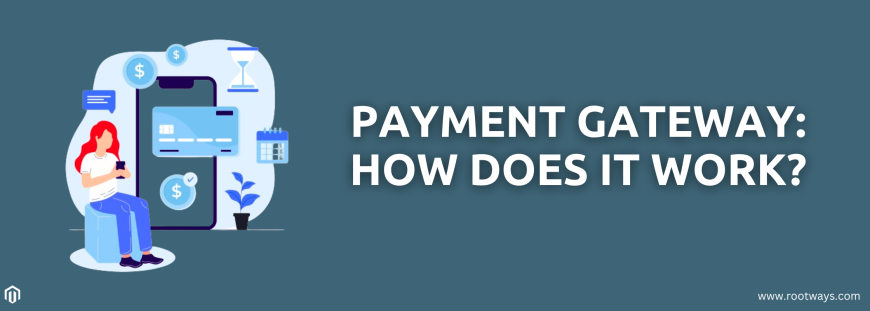
Payment Gateway: how does it work?
Payment gateways are becoming increasingly important as the globe quickly shifts from physical businesses to e-commerce. Integrating a payment gateway is necessary when entering the internet market regardless of your product or business.
In this blog, we'll examine the definition of payment gateways and the workings of their systems.
What is a Payment Gateway?
A payment gateway is a specialized software program that makes it easier for a merchant, a client, and the participating financial institutions to securely and conveniently transfer financial information. It functions essentially as a link between the several parties engaged in an online transaction. Between a merchant and the financial institution handling the payment, it serves as a middleman. A payment gateway comprises a payment processing terminal integrated into an online store and a physical card reading device or point-of-sale terminal used at a typical brick-and-mortar store.
It controls the money transfer, approves debit or credit card purchases, and gives the retailer a unified interface for handling transactions. Payment gateways can be used in in-store and mobile settings, as well as in online and offline environments. Payments can be accepted via a mobile app, phone, or online with a payment gateway. After processing the transaction through their system, the service provider will forward it to the customer's bank for verification.
The service provider will route the transaction through their internal processing system, which will handle the transaction and send it to the client's bank for validation. Hosted and direct payment gateways are the two types available. By enabling customers to enter their card information directly into the store, the direct payment gateway expedites the processing of payments.
How Does a Payment Gateway Work?
A customer fills out a payment page at checkout with their credit or debit card information. The payment gateway either hosts the full payment page or encrypts the entered data and sends it securely to the payment gateway.
The payment gateway sends the cardholder's data and transaction details to the merchant's acquirer after encrypting the card details and performing fraud checks.
The information is forwarded by the acquirer to the issuing bank and then to the card scheme. After doing additional fraud checks, the payment is approved or denied.
The authorization decision follows the same path to the payment gateway, informing the merchant and the customer of the payment's approval or rejection. The payment page will either show payment confirmation or, if the payment method is rejected, will request that the customer try another one. This will depend on the issuing bank's decision.
Why Is a Payment Gateway Required?
Payment gateway integration is essential for many reasons, regardless of whether you are managing an online store, providing subscription services, or taking donations.
- Facilitates Online Transactions
The digital link that makes quick and safe online transactions possible is a payment gateway. It allows organizations and private citizens to pay online for gifts, products, and services, giving clients a smooth and practical experience.
- Enhances Customer Trust
Security plays a critical role in online transactions. Sophisticated encryption technologies are used by reliable payment gateways to safeguard private financial data from intrusions. Customers trust this dedication to security, encouraging them to transact with assurance.
- Global Accessibility
A payment gateway gives worldwide firms access to a more extensive consumer base. Because it supports cross-border payments and accepts a variety of currencies, it allows transactions from clients all over the world. Reaching a wider audience and drawing in a varied clientele require this accessibility.
- Supports Various Payment Methods
There is a wide range of preferences among consumers about payment options. By taking a variety of payment options, such as bank transfers, digital wallets, debit cards, and credit cards, a payment gateway allows for this diversity. This adaptability guarantees that companies can accommodate a broad spectrum of client demands.
- Reduces Payment Risks
Payment gateways reduce the risk involved in online transactions by utilizing robust security features and fraud prevention techniques. Processes for real-time identification and validation greatly lower the possibility of fraudulent activity, safeguarding consumers and retailers alike.
- Efficient Fund Management
Payment gateways make it easier to manage money by automating procedures like chargebacks, refunds, and fund transfers. Due to improved financial control, businesses can better trace transactions, balance accounts, and efficiently manage cash flow.
Conclusion
Integrating a payment gateway is vital for organizations navigating the digital landscape, not just a technical one. Its numerous functions in enabling secure online transactions, fostering client confidence, and offering accessibility from anywhere in the world highlight its importance in the modern commerce ecosystem. Encouraging clients to engage in digital commerce confidently is facilitated by providing strong security measures, effectively solving a significant worry in online transactions. The payment gateway is crucial in helping organizations grow internationally by facilitating transactions in several currencies and meeting various payment preferences. Along with support for multiple payment methods and regulatory compliance, these risk mitigation features help create a robust framework that protects customers and merchants. Integrating a payment gateway allows firms to navigate financial complexities precisely, enabling effective money management beyond transactional facilitation. Payment gateways play an essential role in the ongoing evolution of digital commerce, helping to shape the online transaction environment and boosting the prosperity of enterprises in the digital age.
CONTACT US; We are always prepared to provide prompt assistance and support.